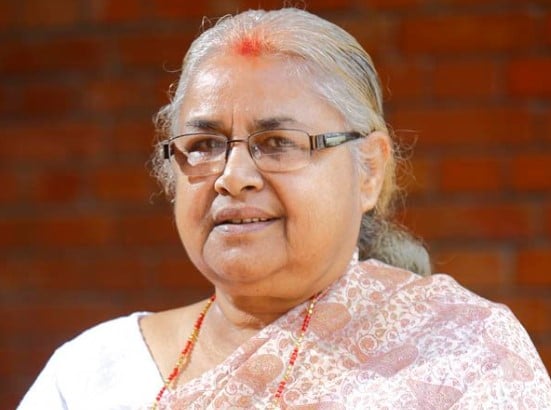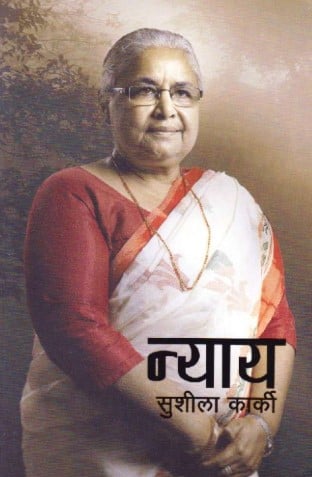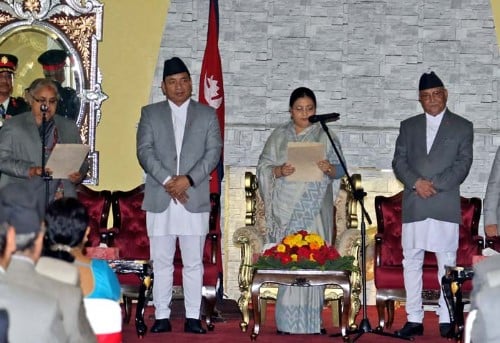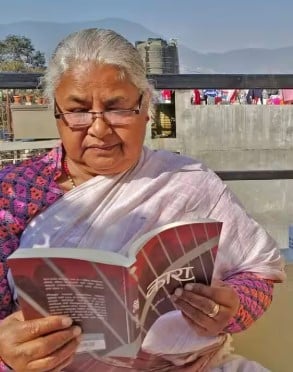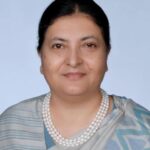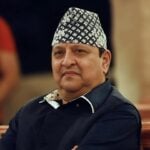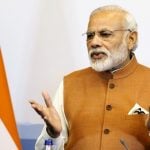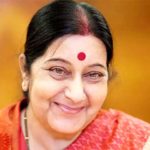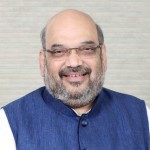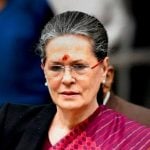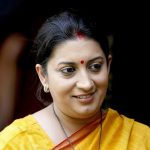Sushila Karki Age, Caste, Husband, Children, Biography
Quick Info→
Husband: Durga Prasad Subedi
Age: 73 Years
Hometown: Kathmandu, Nepal
| Bio/Wiki | |
|---|---|
| Profession(s) | • Professor • Advocate • Justice • Writer |
| Famous for | Being Nepal's first woman chief justice |
| Physical Stats | |
| Height (approx.) | 5' 4" (163 cm) |
| Eye Colour | Light Brown |
| Hair Colour | Salt and Pepper |
| Personal Life | |
| Date of Birth | 7 June 1952 (Saturday) |
| Age (as of 2025) | 73 Years |
| Birthplace | Biratnagar, Morang District, Nepal |
| Zodiac sign | Gemini |
| Nationality | Nepali |
| Hometown | Kathmandu, Nepal |
| College/University | • Mahendra Morang Campus, Biratnagar, Nepal • Banaras Hindu University, Varanasi, India • Tribhuvan University, Nepal |
| Educational Qualification(s) | • A bachelor degree in Arts (1972) from Mahendra Morang Campus • A master degree in Political Science (1975) from Banaras Hindu University • A bachelor degree in Law (1978) from Tribhuvan University |
| Religion | Hinduism |
| Caste | Brahmin |
| Hobbies | Writing, Reading, Dancing |
| Relationships & More | |
| Marital Status | Married |
| Family | |
| Husband/Spouse | Durga Prasad Subedi(former Nepali Congress youth leader) |
| Children | Son- Prasant Subedi Daughter- None |
| Siblings | Note: She has 7 siblings |
Some Lesser Known Facts About Sushila Karki
- Sushila Karki was born into a middle-class farmer family in Shankarpur, Biratnagar, Morang District of Nepal
- She is the eldest daughter of her parents. Despite the conservative social environment of the 1950s, her parents encouraged all their children to pursue education.
- In an interview, Sushila mentioned that the political democratic views of the former prime minister of B.P. Koirala inspired Sushila’s father, so he also joined politics at that time.
- In the late 1960s, when democracy rose in Nepal, Sushila Karki’s father decided to leave Biratnagar and shift to Kathmandu.
- In an interview, Karki shared that her father wanted her to become a doctor, but since she wasn’t good at mathematics, she chose to study Arts instead. One day, her father saw a photograph of a chief justice from another country in a newspaper and showed it to her, saying that if she couldn’t become a doctor, she could still become a Chief Justice.
- In an interview, Karki once mentioned that after completing a master’s in political science from Banaras Hindu University (BHU), she was offered the chance to teach at BHU and pursue a PhD there. However, she could not continue her studies and moved back to Nepal, and enrolled in studying Law at Tribhuvan University. She mentioned that,
Perhaps my destiny was different. I feel I was destined to be a judge, and that is why I could not pursue my PhD there.”
- When she was studying at BHU, she met her husband, Durga Prasad Subedi. He was a popular youth leader in Nepal at that time.
- In 1979, after completing her studies, Karki started her law practice in Biratnagar. However, at that time, she was not very experienced, so it was not easy to work. In an interview, she mentioned that, at that time, there were very few educated women in Nepal, so her degree gave her high respect in society.
- In 1985, Karki initially worked as an assistant teacher in Mahendra Multiple Campus, Dharan.
- In 2007, she became a senior Advocate at the Supreme Court of Kathmandu, Nepal.
- On 22 January 2009, Karki was appointed an Ad hoc Justice at the Supreme Court and a permanent Justice on 18 November 2010.
- On 11 July 2016, Sushila Karki was appointed as the 24th Honourable Chief Justice of the Supreme Court by then-President Bidya Devi Bhandari. She held this position for nearly a year, until 7 June 2017.
- After her appointment, she became the first woman ever to hold this position till now in Nepal.
- Because she bravely spoke out for women’s rights in Nepal, many political people accused her of being too much of a feminist. She talked about many women’s issues, including rape, compensation, women’s rights, and murder.
- In 2016, Karki made a law that allowed Nepali women to independently pass citizenship to their children. This decision broke down the patriarchal barriers that had remained in the 2007 Citizenship Act.
- During her tenure as chief justice of Nepal, Karki didn’t let politicians interfere in court work and decisions and always stood up against political pressures.
- On 30 April 2017, the Maoist Centre and the Nepali Congress brought an impeachment motion against Sushila Karki in Parliament. This happened after the Supreme Court, under her leadership, reversed the government’s decision on who should be appointed as chief of police. However, due to strong public opposition and a temporary order from the Supreme Court, Parliament withdrew the impeachment motion and did not move forward with it.
- Some of the notable decisions she made in her law career are Office of Nepal Trust v. Prerana Rajya Laxmi Rana (Property of former Royal Princess) (2015), Prithivi Bahadur Pandey v. Kathmandu District Court (Corruption in the printing of polymer bank notes in Australia) (2015), Kathmandu Nijgarh Fast Track Case (2016), Surrogacy Case (2016), and Om Bhakta Rana v. CIAA/Government of Nepal (Sudan Peacekeeping Mission Corruption) (2017).
- Throughout her career, Karki was known for standing firmly against corruption. She even faced a lot of criticism and blame for focusing mostly on fighting corruption. In 2012, she ordered the conviction of Jaya Prakash Gupta on corruption charges, making him the first sitting minister in Nepal to be jailed.
- Sushila Karki has published her two books. First is her autobiographical book “Nyaya”, which was published on 28 September 2018, and the second was a novel named “Kara”, which was published in December 2019.
- In September 2025, following Gen Z protests and the resignation of Prime Minister KP Sharma Oli, Sushila Karki was chosen by Nepal’s youth-led movement to lead the Interim Government as Prime Minister. However, her selection at the age of 73 received mixed reactions, especially from protesters who had previously supported younger leaders like Balen Shah.
- On 10 September 2025, a 4-hour virtual meeting was conducted by Nepal’s Gen-Z protesters, where they discussed potential candidates for the country’s next government. Over 5000 members participated in that meeting and gave the majority of support to Sushila Karki. In an interview, Gen Z leader Rakshya Bam mentioned that,
We have proposed Sushila Karki as head of new government. The same proposal is being formalised after consulting with the Army Chief.”
- In Nepal and South Asia, Sushila is widely honored as a trailblazer for women in law. Her leadership is often cited in international legal forums as an example of judicial independence.
- She has also been invited as a speaker, mentor, and panelist in discussions on law, democracy, and women’s empowerment at various events and organisations worldwide.
- Sushila Karki is an avid dancer. She has learnt dance from the wife of Nepal’s prime minister, B P Koirala, Sushila Aama.
- Sushila is multilingual in Nepali, Hindi, and English.

